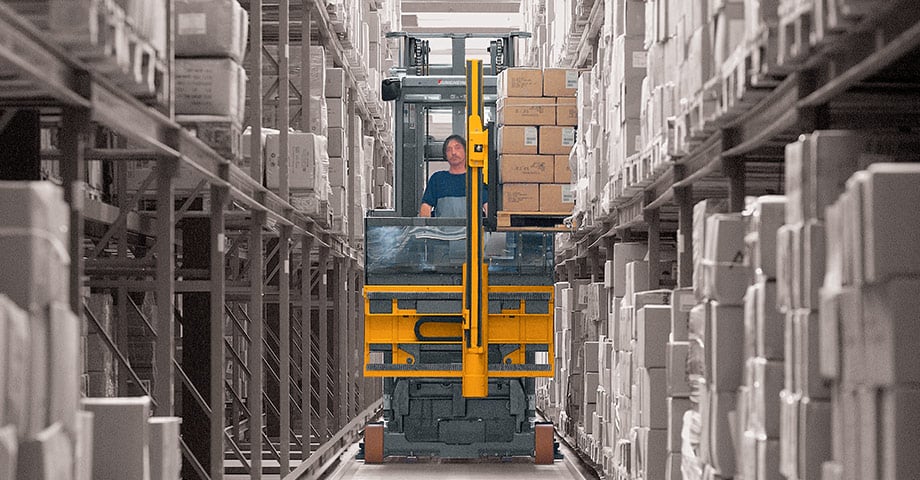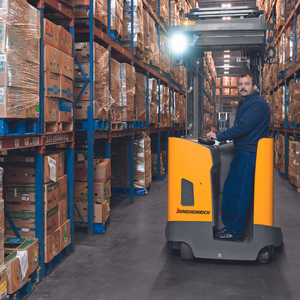
Demand for electric forklifts continues to increase. According to the Industrial Truck Association (ITA), electric forklifts represent nearly 70% of all factory shipments in the United States. This trend will only continue, as electric forklifts offer greater efficiency, versatility and cost savings when compared to gas forklifts.
Are you debating whether to add electric forklifts to your operation? There are many undeniable benefits that make them a preferred choice over gas powered lift trucks.
7 Benefits of Electric Forklifts
1) Long-term Cost Savings
With engines that are two-to-three times more efficient than their internal combustion counterparts, electric forklifts offer better fuel efficiency and can limit energy costs by as much as 20%. While the upfront price of an electric forklift is higher than that of a gas lift truck, the energy cost savings you experience over the long-term will more than make up for the price difference.
2) Increased Productivity
Electric innovation has rapidly advanced, which means electric forklifts are running longer and increasing overall productivity. Some electric forklifts can run for 16 consecutive hours - or two 8-hour shifts - without needing a charge. Instead of stopping production to replace propane tanks on gas lift trucks, your forklift operators can move more product and increase throughput with electric forklifts.
3) Better Performance
Electric forklifts offer faster acceleration and greater maneuverability than gas forklifts, which enables your operators to move more product in the same amount of time. Because of their compact design and tight turning radius, electric forklifts can operate easily in confined spaces, such as very narrow aisles and within the back of box trucks.
4) Low Cost of Ownership
Forklifts are expensive pieces of equipment, and are even more expensive to maintain. Over the life of a single lift truck, owners will incur a number of expenses, including repair costs, fuel, replacement parts, and regular maintenance fees. Instead of looking at the upfront price, buyers should consider the total cost of owning a forklift. And in this regard, electric forklifts are far superior to gas.
Over a five-year span, electric forklifts will typically incur just one quarter of the costs of an internal combustion lift truck. While you will spend more on the initial purchase price, the annual cost savings of an electric truck can range anywhere from $6,000 - $14,000 per year when combining fuel and maintenance costs.
5) Zero Emissions
Electric forklifts do not produce emissions, which make them better for the environment, the health of your team members, and the quality of your product. Since electric forklifts are battery operated, the air quality of your facility will be drastically improved due to the elimination of exhaust fumes. In addition to reducing the burden on your air ventilation, this promotes a better work environment for your team.
6) Versatility
Due to their ability to handle both indoor and outdoor applications, electric forklifts offer versatility for any type of operation, from food and beverage distribution centers, to cold storage facilities, to manufacturing plants.
7) Government Incentives
Many federal, state and local government incentives are available to companies that transition their fleet from gas-powered forklifts to electric. Companies can benefit from tax credits, grants, low-interest loans and other financial incentives by purchasing electric forklifts, or upgrading their existing fleet. At times, these incentives can even offset the cost of the initial investment, which further makes electric forklifts a cost-effective option.
For a full list of government incentives, visit the U.S. Department of Energy’s website.
How Electric Forklifts Can Help You
Advancements made across decades of technological innovation have made electric forklifts the ideal choice for most businesses. If you’re looking for more information on the cost savings and efficiency gains you could experience by adding electric lift trucks to your operation, the experts at Equipment Depot are here to help. Give us a call today at 888.EQDEPOT and one of our material handling consultants will help you make the right choice for your operation.


